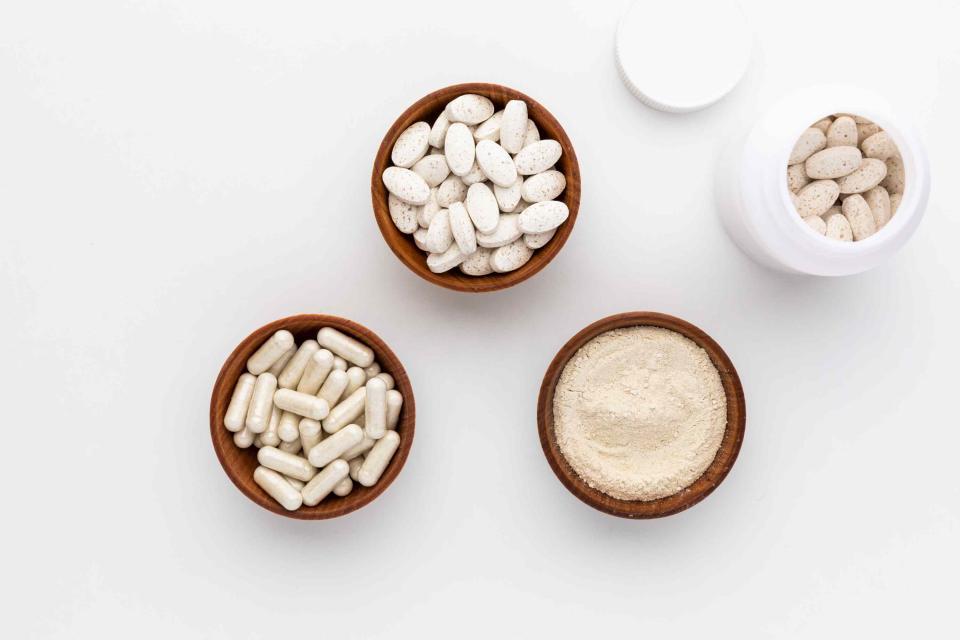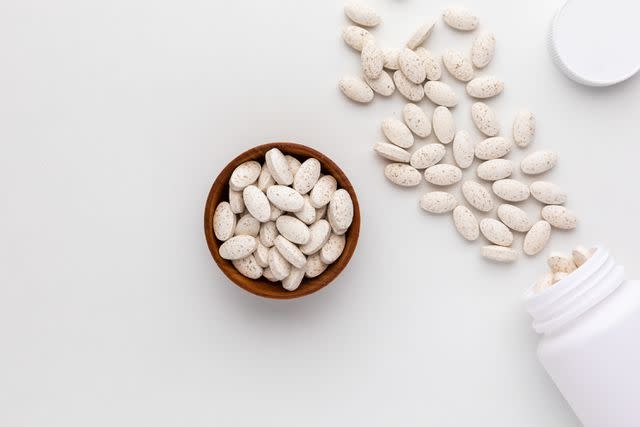Pancreatin: Uses, Side Effects, & More
For Pancreatic Insufficiency (Such As in Cystic Fibrosis)

Verywell / Anastasia Tretiak
Medically reviewed by Fallon Mumford, PharmD
Pancreatin (also known as pancreatin systemic or pancrelipase) is a prescription medication that contains several digestive enzymes. These enzymes are normally made in the pancreas and other areas of the body.
Pancreatin helps break down food and convert it into energy. This medication is a commercial mixture of enzymes, including amylase to digest starch, protease to digest protein, and lipase to digest fat.
This article will go over how pancreatin is used, as well as the possible side effects and risks of taking pancreatin.
Uses
Pancreatin is often used to treat health problems that cause the pancreas to either not make or release enough pancreatic enzymes:
Cystic fibrosis (CF)
Long-term inflammation of the pancreas (chronic pancreatitis)
Cancer of the pancreas
Conditions that happen after surgery on the pancreas or gut
Loose, fatty stools (steatorrhea)
Pancreatin can be useful for managing these health conditions because it can:
Help break down several key nutrients, including proteins, fats, and carbohydrates, that the body needs for energy
Help with the absorption of essential vitamins and minerals
Promote healthy weight gain and maintenance of a healthy weight
Some people take digestive enzymes like pancreatin for GI symptoms like heartburn. However, more evidence is needed to support using digestive enzymes for indigestion and other digestive symptoms.
Disorders of the Pancreas
Pancreatin can be used when the pancreas is not making enough digestive enzymes such as amylase, lipase, or protease. This condition is called pancreatic insufficiency.
One disorder that causes pancreatic insufficiency is cystic fibrosis (CF). In CF, thick, sticky mucus is released and can clog the pancreas and other parts of the body such as the lungs. The mucus prevents the effective secretion of pancreatic enzymes.
According to the Cystic Fibrosis Foundation (CFF), most patients with CF have pancreatic insufficiency and need to take digestive enzymes.
Taking enzymes such as pancreatin helps with the assimilation of nutrients, which promotes weight gain. Being underweight can present health challenges for people with CF, and being nourished and at a healthier weight has been linked to better lung function. Taking enzymes with each meal and snack can be an important part of managing nutrition for people with CF.
Pancreatin Research Studies
Taking pancreatin supplements has been shown in clinical research studies to help promote efficient digestion and proper absorption of nutrients in people with conditions that have affected their pancreatic function.
A 2012 randomized, controlled clinical research trial looked at participants with pancreatic insufficiency caused by long-term pancreatitis. After six months of taking pancreatin, the participants saw improved flatulence (gas), abdominal pain, diarrhea, and steatorrhea (fat in the stools). The study also showed that treatment with pancreatin was effective in treating symptoms of pancreatic insufficiency from cystic fibrosis.
A study in 2013 found pancreatic insufficiency improved for those who took pancreatin after pancreatic surgery compared to those who took “sugar pills” with no active medication in it (placebos).
Potential Side Effects
Many people taking pancreatin do not have side effects, but they are possible. While taking pancreatin you may have:
Diarrhea
Abdominal pain or cramps
Nausea
Tell your provider right away if you have severe nausea, vomiting, diarrhea, or any other concerning symptoms while you’re taking pancreatin.
While it’s rare, you should know the possible symptoms of an allergic reaction to pancreatin, which include:
Hives or welts
Headaches
Mild abdominal pain
Mild nausea and vomiting
Severe allergic symptoms may include:
Difficulty breathing
Swelling of the face, lips, or eyes
Swelling or constriction of the throat or tongue
Wheezing
Difficulty talking
Dizziness
Collapse
Severe allergic reactions are a medical emergency. If you have symptoms of an anaphylactic reaction or shock, you need immediate medical attention.
Contraindications
There are some instances where pancreatin should not be taken because it could cause harm to a patient.
Before taking pancreatin, tell your provider if you:
Have asthma
Have gout
Are pregnant (safety of using pancreatin has not yet been established for pregnant people)
Are breastfeeding (safety of using pancreatin has not yet been established for breastfeeding people)
You should also talk to your provider before using pancreatin if:
You take antacids. Avoid taking antacids for at least one hour before taking pancreatin.
You have a pork allergy. Do not take pancreatin if you are allergic to pork because most commercial pancreatin preparations come from pigs.
You have lactose intolerance. Talk to the provider before taking pancreatin if you are lactose intolerant, as many commercial preparations of pancreatin contain lactose.
You take other digestive enzymes. Do not take any other digestive enzymes with pancreatin unless prescribed by your healthcare provider.
You use laxatives. Do not give laxatives or antacids to any children taking the higher strength preparations of pancreatin (such as Pancrease HL or Nutrizym 22) because it could increase the risk of damage to the intestines.

Verywell / Anastasia Tretiak
Dosage and Preparation
Preparation
Pancreatin is available in several forms, including:
Tablets
Granules
Powder
Prescription forms are only available in tablets and capsules. Pancreatin or pancreatic enzymes are usually made from cows or pigs but can also come from plant sources.
There are many pancreatin products available commercially. The enzyme amount in each kind will vary. It’s important to talk with a healthcare provider about which type of pancreatin is best for you.
How to Take Pancreatic Enzymes
Your provider will tell you how to take pancreatin, but in general, pancreatic enzymes work best when taken at the start of meals.
Here are some other things you should know about taking pancreatic enzymes:
Pancreatin capsules have a special coating (enteric coating) that protects them from stomach acid and makes sure they get to the small intestine, which is where nutrients are absorbed. That’s why you should never crush or chew pancreatin. You need to take the capsule whole.
You should take pancreatin before each meal or snack (this includes formula or breast milk for infants).
It’s best to take pancreatin with a full glass of water.
When opening the capsules, do not mix digestive enzymes with milk or foods that are milk-based (such as pudding). The lactose in these foods may break down the enteric coating on the beads.
Keep extra pancreatin capsules handy for when you decide you want to eat a snack or a meal or have milk or another beverage that contains food.
Some foods (e.g., popsicles, hard candy, or fruit juices) do not require pancreatic enzymes to digest.
If meals take longer than 30 minutes to complete, it might be beneficial to split the enzyme dose in half. For example, take half at the beginning of a meal, and the other half in the middle of the meal.
If you need to give pancreatin to small children who cannot swallow pills, try sprinkling the beads (without crushing them) on a small amount of acidic, soft food that does not require chewing, such as applesauce.
Dosage
Studies have suggested that the minimal dose of pancreatin is 25,000–50,000 units. However, the therapeutic dose can vary depending on a person’s condition, age, symptoms, and other health factors.
For example, your provider may want you to take a specific number of capsules with a meal, and a smaller number with each snack. Or you may have to adjust your dose according to the fat content in a meal or snack.
If you have CF or another health condition that affects normal fat digestion, your provider will consider the amount of lipase in the medication they prescribe because lipase is the enzyme that breaks down fat.
Do not skip doses of pancreatin. Take it as prescribed by your provider.
Can You Take Too Much Pancreatin?
Studies have found that taking too many pancreatic enzymes can potentially cause damage to the intestines. Talk to your healthcare provider before taking pancreatin or any other type of enzymatic supplement.
To find out how many units of lipase, protease, and amylase there are in a specific brand of enzyme supplements, check the label on the side of the bottle.
Do not change brands without talking to your provider, as how much of the enzymes are in different products can vary.
Storage
It's best to store pancreatin at room temperature and keep the supplements away from heat (e.g., do not store them near the stove or in a hot car). Heat can destroy the enzymes and make them no longer work.
What to Look For
Unlike many other dietary supplements, the U.S. Food and Drug Administration (FDA) started regulating pancreatic enzymes in 1991. The regulation was necessary because there was a wide range of enzyme mixtures being formulated by different brands of pancreatic enzyme preparations (PEPs).
Today, there are only 6 brand names of pancreatic enzymes that are FDA-approved:
Creon
Zenpep
Pancreaze
Ultresa
Viokace
Pertzye
Summary
Your provider may want you to try pancreatic enzymes if you have a health condition that prevents your body from getting all the nutrition you need from the food you eat, particularly fat.
Unlike most supplements, the FDA has approved 6 pancreatic enzyme products. Depending on your needs, your provider will prescribe a dose for you and tell you when to take them, but it will usually be when you have meals and snacks.
Frequently Asked Questions
How do I know that pancreatin is working?
Sometimes there is no outward change in symptoms after taking digestive enzymes, but your healthcare provider or other healthcare provider may perform blood tests, or take a stool sample, to find out if pancreatin is working. The healthcare provider will use the lab test results to evaluate the dose and duration that the enzymes should be given.
What should I do if my symptoms get worse after taking pancreatin?
Inform your healthcare provider if symptoms do not improve, or they get worse while taking pancreatin.
Why am I experiencing itchiness on my hands when handling pancreatin beads to mix with applesauce for my child?
A rash, or itchiness that occurs upon contact of pancreatin is common in some people. If this occurs, wearing thin gloves may be needed when handling pancreatin.
How can I learn more about the side effects, and other information about pancreatin?
The packet that comes with your prescription will go over the side effects and other important information you should know about pancreatin. If you have questions, ask your pharmacist or provider.
Read the original article on Verywell Health.

